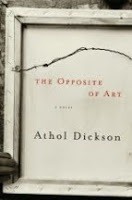
I think The Opposite of Art may be the best of my novels, at least from a “writerly” perspective, by which I mean I tried hard to make the story not only entertaining, but beautiful. The teaser goes like this:
A great artist is cast into the icy Harlem River by a hit-and-run driver. His heart stops, and he sees something that defies description. Presumed dead by all who knew him and obsessed with the desire to paint the inexpressible, he embarks on a pilgrimage to seek help from holy men around the globe. But is it possible to see eternity without becoming lost within it? After a quarter of a century, when the world begins to whisper that he may be alive, two people come looking for the artist: the daughter he never knew existed, and the murderer who hit him on the bridge all those years ago.
Now here’s a little taste for you, in which the protagonist tries to cover the Vatican’s massive perimeter wall with a drawing of something he saw once while he was clinically dead….
As he had beneath the Sistine ceiling, Ridler paced the sidewalk. Back and forth beside the looming ramparts, he paced. All the years swirled through his mind, the cost of jungles, beaches, filthy alleys and bazaars, tortured and exploded, hungry, parched, lonely and alone, and of course Suzanna. Suzanna lost forever. He had surrendered everything to paint the Glory, trying it a thousand times, a thousand ways, miles of paint, gallons of it flowing across canvas by the acre. What were these imposters’ feeble efforts compared to sacrifice like his?
“I’ll show them,” he muttered, dropping to his knees and opening his backpack. “I’ll show them.”
Removing his kit he spilled his pastels out onto the sidewalk. Still muttering, he selected a piece of chalk and began to sketch. His arm swung broadly over the pavement, a giant motion from the shoulder. Line after sweeping, monumental line arched across the slates around him. He was no mere artist. He was an athlete, a zealot and a warrior. He was no propagandist. He was a partisan, a dogmatist in possession of all truth. He alone could show the Glory to the world, and he alone would do it.
Driven by his rage and his disdain, Ridler lost all consciousness of his surroundings. He did not see the crowd gathering about him as his colors rose from the pavement to the ancient ramparts of the Holy See. He did not hear their whispers, nor their gasps and exclamations as the image swelled and spread. He climbed the wall with only fingertips and the narrow edges of his boots, clinging to the bricks stacked earthy and steadfast for generations. Halfway up he released his hold and drifted. Gripping colored chalk in both of his hands, he drew with unerring beauty and precision on his left and right at once, a whirlwind of pristine intention, filling empty voids as if he was a witch conjuring a portal to a future or a past. He almost had it now. This time he would hold it fast. He would draw back the veil. He would reveal the Glory. He would not let it go. He would master everything.
Ridler drew among a cloud of witnesses. No carabinieri stepped forward from that growing crowd to protest on behalf of public property. On the contrary, the police in their white belts and chest straps stood entranced along with bankers and tourists, priests and beggars. Dozens of them turned to hundreds; hundreds turned to thousands. From the street and sidewalk, from the windows, balconies, and rooftops, all of Rome observed in breathless silence.
It never crossed the artist’s mind that he might run out of colors. Again and again he pulled more pastels from his pack, never realizing it had become a cornucopia, endlessly fertile, providing everything required. Nothing was withheld. The sun itself beyond the angry clouds did not betray him. On the contrary, it remained aloft long past the normal hour, granting the suspension of time. Even gravity and space surrendered, all created things in all directions bowing in submission to his genius.
In the end it seemed the only limit was himself, for when he stopped it was his own decision. Hands and arms and clothing choked with color, Ridler sat back on his haunches. At that very moment the sun began to move again above the clouds, but it took a while to regain its usual velocity. And like the fading of the day, Ridler’s own return was gradual, a slow recognition of the image spread out all around him. Shadows gathering, he gazed upon the work.
It covered half a block along the sidewalk. It climbed forty feet up the wall. It was of course his grandest effort, superior to anything that Rome had ever seen. Thousands knelt around the fringes, hands clasped at their chins, palms turned up toward heaven. Their whispered prayers combined and interlaced in midair, flowing hot across his face. Their adoration of the image plucked him to his feet as if he were a puppet pulled by strings. He disappeared into them, staggering with painful joints, fleeing yet another failure, for he was well aware that this was merely one more flawed beginning. As he had so many times before, he had reached the end of Ridler without capturing the Glory.